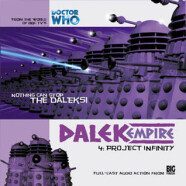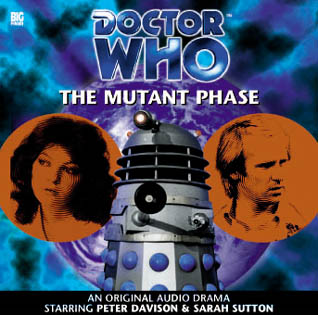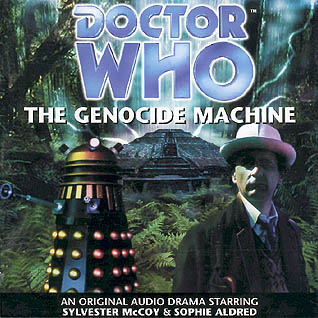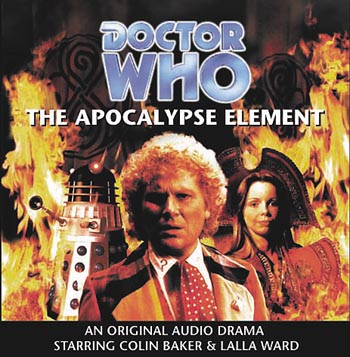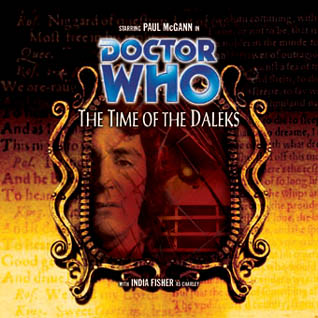Review – Big Finish: Dalek Empire I
This week we’re taking a break from the normal run of Big Finish Doctor Who audios.  Instead, this entry takes a look at a 4-part mini-series that showed up interlaced with the regular monthly series at about this point in the run.  It recycles the Dalek Empire title, and trust me when I say that’s about all it recycles.  Remember back when I was covering the previous Dalek stories, I said as big as those were, they were building to something far bigger?  Welcome to the beginning of that “something bigger.”  Rather than cover this in 4 separate parts as Big Finish does, I’ve decided to cover all of Dalek Empire I as one big epic story.  After all, there are also Dalek Empire II, III, and IV to cover later, each of them 4-parters as well.  Given the sheer size and scope of this mini-series, I trust everyone will indulge me if I run a bit long and geek out over one of the best Dalek stories ever written.
Since these are essentially four separate audios, I’ll have to do this a little differently this time, but let’s see if we can make this a bit cohesive to the whole, shall we?
From Big Finish’s site:
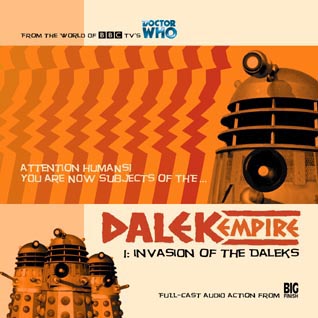 1.1 Dalek Empire: Invasion of the Daleks
1.1 Dalek Empire: Invasion of the Daleks
The Milky Way is at peace.
After centuries of struggle, the Earth Alliance has been created and all is well.
Then, without warning, the Daleks launch their invasion.
An invasion which threatens to tear apart the fabric of our entire galaxy…
Written By: Nicholas Briggs
Directed By: Nicholas Briggs
Cast
Sarah Mowat (Susan Mendes); Mark McDonnell (Alby Brook); Gareth Thomas (Kalendorf); Jon Wadmore (Pellan); Joyce Gibbs (Narrator); Ian Brooker (Admiral Cheviat/Ed Byers/Roboman); David Sax (Tanlee); Nicholas Briggs & Alistair Lock (Daleks)
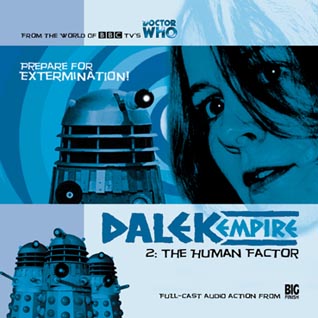 1.2 Dalek Empire: The Human Factor
1.2 Dalek Empire: The Human Factor
Alby Brook and Gordon Pellan are following the best information they have to locate Suz in Dalek-infested space. But what is it the Daleks want with her?
On the slave planet Guria, Alby discovers Suz is already gaining a reputation as something of an angel of mercy. Could it be that she is now working for the Daleks?
But as Suz and Kalendorf travel from planet to planet, a murmur of defiance is growing… ‘Death to the Daleks… death to the Daleks…’
Written By: Nicholas Briggs
Directed By: Nicholas Briggs
Cast
Sarah Mowat (Susan Mendes); Gareth Thomas (Kalendorf); Joyce Gibbs (Narrator); Ian Brooker (Wenay/Drudger/Gurian); David Sax (Morebi); Mark McDonnell (Alby Brook); John Wadmore (Pellan); Adrian Lloyd-James (Highness); Georgina Carter (Daughter); Nicholas Briggs & Alistair Lock (Daleks)
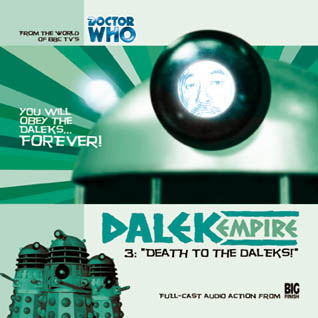 1.3 Dalek Empire: “Death to the Daleks!”
1.3 Dalek Empire: “Death to the Daleks!”
Suz decides it is time to take control of events. But when she is summoned to an audience with the Dalek Emperor, she begins to fear that all her efforts have been in vain.
Meanwhile, Earth Alliance Security commander-in-chief Tanlee is intent on locating Alby. The Dalek advance across the galaxy seems unstoppable and the only possibility of salvation for the human race lies in the Lopra System. But how can Alby help, when no one will tell him the purpose of ‘Project Infinity’?
Written By: Nicholas Briggs
Directed By: Nicholas Briggs
Cast
Sarah Mowat (Susan Mendes); Gareth Thomas (Kalendorf); Joyce Gibbs (Narrator); Ian Brooker (Espeelius/Karik/Elisonford); Jeremy Fielder (Starlos/Barman); David Sax (Tanlee); Mark McDonnell (Alby Brook); Teresa Gallagher (Mirana/Earth President); John Wadmore (Pellan); Adrian Lloyd-James (Highness); Georgina Carter (Daughter); Nicholas Briggs, Alistair Lock & Steven Allen(Daleks)
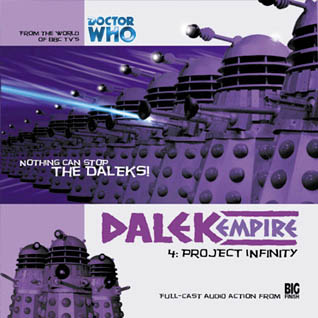 1.4 Dalek Empire: Project Infinity
1.4 Dalek Empire: Project Infinity
The Seers of Yaldos have a sad story to tell, but Alby and Kalendorf know they must listen.
Meanwhile, the Daleks seem unconcerned by their recent defeats. They have their sights firmly fixed on Project Infinity. In the hands of the Daleks, the human race’s only hope of victory could signal the destruction of the entire universe.
Written By: Nicholas Briggs
Directed By: Nicholas Briggs
Cast
Gareth Thomas (Kalendorf); Teresa Gallagher (Mirana); Mark McDonnell (Alby Brook); Joyce Gibbs (The Seer); Simon Bridge (Dr Johnstone); Ian Brooker (Espeelius); Jeremy James (Herrick); David Sax (Tanlee); Nicholas Briggs, Alistair Lock, Steven Allen & Robert Lock (Daleks)
***minor spoilers ahead***
Let’s be perfectly candid for a moment.  The Daleks are one-note villains, are they not?  In the classic TV series, they were known for simply exterminating or exploiting anything and everyone that was not a Dalek for the sole purpose of Dalek supremacy.  Into the 4th Doctor’s run, we were given their backstory and introduced to Davros, which then provided a crutch for every later Dalek appearance to give the Daleks a little variance and flavor.  It weakened them.  In the current incarnation of the series, the crimes against the Dalek character have weakened them even further with the knowledge that now they can feel fear and possibly even pity, and the fact that they now elect a parliament is beyond laughable.  I submit, ladies and gentlemen, that Daleks have been ruined for TV, completely and irrevocably until such a time as somebody takes them back to basics.  I don’t like saying it any more than any fan wants to hear it, but for stories to advance in ways that make sense to the lore created over the course of decades, they must be true to the best parts of that lore.  But Daleks are boring, one-note villains!  Hey, I feel your pain, but more often than not, the answer to making them fresh and new all over again isn’t breaking them and rebuilding them into something that they inherently are not nor should ever be.  Instead, the solution is to push them forward in a way that honors who and what they are at the core.  Daleks are one-note villains, which makes them relentless in their pursuit of that one note.  They are the single biggest threat in the Whoniverse.  Big Finish to the rescue!
By now you’ve likely read my reviews for the original Dalek Empire trilogy, as it was so called: “The Genocide Machine,” “The Apocalypse Element,” and “The Mutant Phase.”  Hopefully you’ve gone back and listened to those stories.  If not, you’re missing out, and those were but a taste of the feast that is this new Dalek Empire mini-series.  What makes Daleks interesting isn’t the idea of the Daleks themselves; it’s what they force the other characters in the story to do as a direct result of their actions.  Consider this sequence from “Genesis of the Daleks,” wherein the 4th Doctor must make the choice whether or not to destroy the entire Dalek race before it has a chance to become the terror we know it to be.
Sarah Jane Smith: Well, what are you waiting for?
The Doctor: Just touch these two strands together and the Daleks are finished. Have I that right?
Sarah Jane Smith: To destroy the Daleks? You can’t doubt it.
The Doctor: Well, I do. You see, some things could be better with the Daleks. Many future worlds will become allies just because of their fear of the Daleks.
Sarah Jane Smith: But it isn’t like that.
The Doctor: But the final responsibility is mine, and mine alone. Listen, if someone who knew the future pointed out a child to you and told you that that child would grow up totally evil, to be a ruthless dictator who would destroy millions of lives, could you then kill that child?
Sarah Jane Smith: We’re talking about the Daleks, the most evil creatures ever invented, you must destroy them! You must complete your mission for the Time Lords!
The Doctor: Do I have the right? Simply touch one wire against the other and that’s it. The Daleks cease to exist. Hundreds of millions of people, thousands of generations can live without fear, in peace, and never even know the word Dalek.
Sarah Jane Smith: Then why wait? If it was a disease or some sort of bacteria you were destroying, you wouldn’t hesitate.
The Doctor: But if I kill, wipe out a whole intelligent lifeform, then I become like them. I’d be no better than the Daleks.
This is exactly what Dalek Empire is all about: the decision not only to live, but to live free, and to overcome a menace like the Daleks without losing your basic humanity in the process.  This story follows the Dalek conquest that unfolds in the wake of “The Apocalypse Element,” wherein they have an entire galaxy to subjugate.  More importantly, it follows a group of slaves that must free themselves from within.  What’s worse, those slaves don’t have the Doctor to help them out.  This means that there must be one (or more) amongst their number prepared to do what must be done… without becoming like the Daleks themselves.  Think of this as the Doctor Who answer to Spartacus.
In this case, our Spartacus is Susan Mendez, who isn’t a warrior at all.  Miraculously and against all odds, Suz convinces the Daleks – believably, and within the context of what we know Daleks to truly be like – of the importance of rest, food, and hope… the Human Factor, if you will.  The unenviable tasks of convincing the Daleks of such things and serving as the mouthpiece to the slaves from the Daleks are hers, which transforms her into a beacon of hope across the galaxy.  Amongst the slaves, she becomes known as the “Angel of Mercy,” which is quite the double-edged sword.  As anyone with human spirit can confirm, when you give the hopeless something to grasp on to, that becomes everything to them, and such hope is fragile at best.  Such a beacon of hope also becomes a rallying point for defiance, and this is where the fun begins.  Every Spartacus needs a Crixus; for Suz, her closest ally and opposite number in all of this is Kalendorf, a Knight of Velyshaa.  You might remember those guys if you’ve followed along.  The Knights of Velyshaa were the badass supremes that Big Finish introduced in their very first Doctor Who audio, “The Sirens of Time.”  This provides our heroine with an additional challenge to the idea of keeping her humanity, considering the Knights of Velyshaa are this close to being just like the Daleks.
At its heart, this story presents the line between achievement and sacrifice, loyalty and betrayal, heroism and death. It is easily one of the biggest stories ever told in the Doctor Who lore, and it stands as a shining example of how to tell a Dalek story properly and still push the boundaries of what is possible with them.  More than that, it’s one of those classic tales that demonstrates just how far people will go – should go – to regain their freedom and their basic humanity in the face of absolute finality. The problem is that, being that they’re facing Daleks, they not only have to contend with everything the Daleks have put in place to keep them as slaves, but they will also have to deal with the hidden objective that the new Dalek Empire has been built upon… an objective that blows open an even bigger new level to this saga.
This one will set you back a little more than the regular series as it is four separate titles, but it’s well worth every penny, in my humble estimation, as it’s one of the very best stories ever told in the Whoniverse. All fans take note: this is how it’s done.

